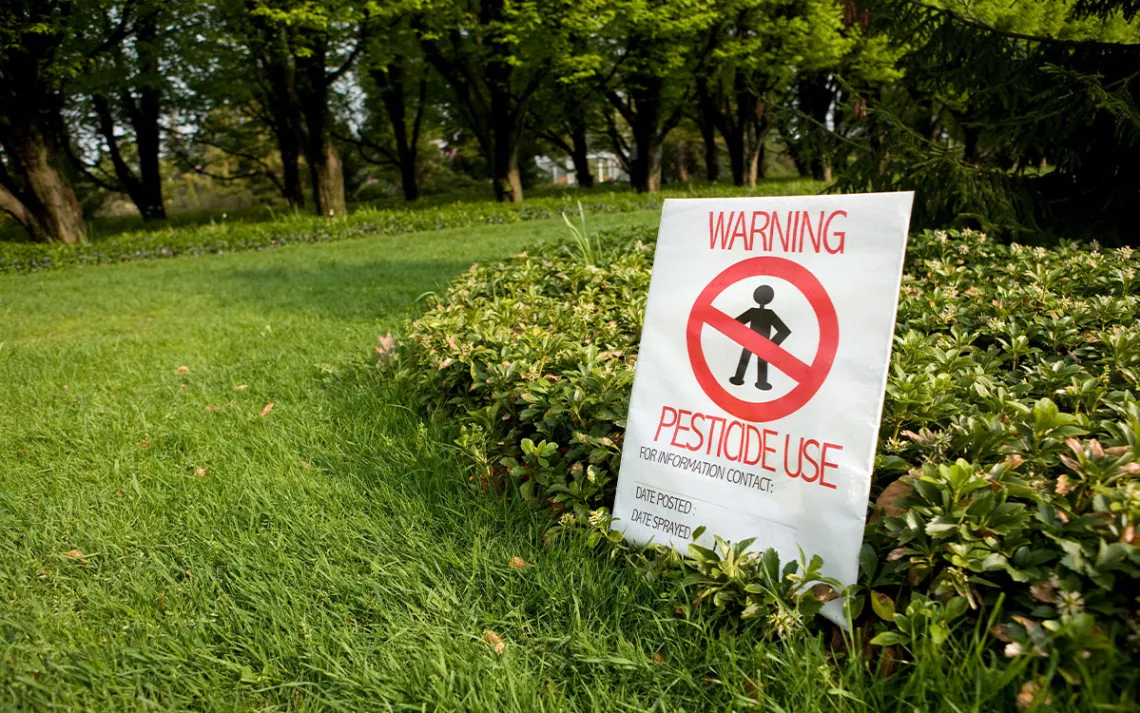EPA Issues Rare Emergency Ban on Weed-Killing Pesticide
The agency faced yearslong challenges as it attempted to regulate Dacthal

Photo by Pgiam/Getty Images
This month, the EPA issued an emergency ban of the pesticide Dacthal, marking the first time in over 40 years that the agency has taken such action.
Dacthal, the shelf name for a chemical compound called DCPA, is commonly used on grasses and crops to control weeds. For decades, research has consistently shown that Dacthal poses severe health risks to pregnant people. The pesticide has been found to cause changes to fetal thyroid hormone levels, which can lead to low birth weight, impaired brain development, and impaired motor skills.
Though the impacts of the emergency ban will be immediate, concern about Dacthal’s health impacts are not new. The EPA first classified the pesticide as a possible carcinogen in 1995 after a study showed that it caused thyroid tumors in some animals, and it was banned in Europe in 2009. But when the EPA requested new data on Dacthal’s health risks from its manufacturer, AMVAC, in 2013, the corporation delayed releasing “sufficient” information for years.
“[The EPA], to some degree, is dependent upon the manufacturer of the pesticide for a lot of their information,” said Rhon Jones, an Alabama-based environmental attorney. “Right or wrong, that’s the way our system works. The manufacturer is oftentimes the most knowledgeable about a product, and in this case, they’ve had it on the market for years.”
The EPA initially set a January 2016 deadline for AMVAC to file some 20 studies on the pesticide’s health impacts, including one to specifically address its impacts on fetal thyroid hormone levels. Yet most of the studies that AMVAC submitted in time were “considered insufficient” to address the agency’s questions, as were several risk-mitigation measures that AMVAC proposed. Other data continued to trickle in through 2021, and the study on thyroid hormone impacts finally materialized in August 2022, over six years after the deadline.
The EPA released a report assessing the risks of Dacthal in May 2023, which found, among other things, that “some pregnant individuals could be subjected to exposures from 10 to 1,500 times greater than what is considered safe.” Though AMVAC offered to change its regulations and ban the pesticide’s use on artificial turf, EPA officials remained concerned about its impacts on agricultural workers. AMVAC did not respond to a request for comment from Sierra.
The August 6 emergency suspension was the culmination of “unprecedented efforts by the Biden–Harris administration” to get data on Dacthal and “assess and address the risk this pesticide poses,” according to the EPA.
The move was “very unusual,” Jones said. In his years of working on environmental litigation, he said he’s never seen the EPA use such urgent language or issue such an immediate product recall. However, it also tracks with an alarming trend he’s noticed: More information is emerging about the harmful health impacts of pesticides. Jones has worked on litigation surrounding other toxic pesticides, like Roundup and Paraquat. And just last month, a study in the journal Environmental Health Perspectives found that 14 percent of all active ingredients in pesticides contain “forever chemicals,” or PFAS.
“If you're going to make a product, I think everyone agrees that that's fine … but part of that social contract is you should be honest and forthcoming about what you know about its toxicity or exposure risk,” Jones said. “I think it's only fair that companies provide timely, full disclosure on that data, and in multiple situations, unfortunately, that’s not happening.”
In the years that passed during the EPA’s back-and-forth with AMVAC, research on the dangers of Dacthal continued to emerge. One study conducted by researchers at the University of California, Berkeley, in summer 2016 tracked a group of teenage girls living in California’s Salinas Valley for a week and found that over half of them were exposed to Dacthal in that time span. A 2009 study by the same research group found traces of Dacthal inside homes that were over 1.5 miles from the nearest agricultural field.
The urgency of the EPA’s August 6 message has left some advocates wondering whether the federal government is doing enough to get toxic pesticides off the market and out of harm’s way. The Pesticide Action Network said in a statement that they were “deeply disappointed in the flawed processes” that delayed a ban on Dacthal. “EPA knew of the potential for harm posed by DCPA for 18 years before taking the first step to suspend it, and then it took another 10 years from that first request for more studies on DCPA to finally suspend its registration. That’s nearly three decades' worth of exposure to a dangerous herbicide,” the statement said.
According to the EPA, banning a product like Dacthal “is resource and time intensive, partly due to the procedural requirements of [the Federal Insecticide, Fungicide, and Rodenticide Act].” If a manufacturer contests EPA efforts to ban a certain product, the process can end up taking several years, the release said.
The emergency order is effective immediately, according to the EPA release, and the agency will issue a notice of intent to cancel DCPA products in the next 90 days.
 The Magazine of The Sierra Club
The Magazine of The Sierra Club



